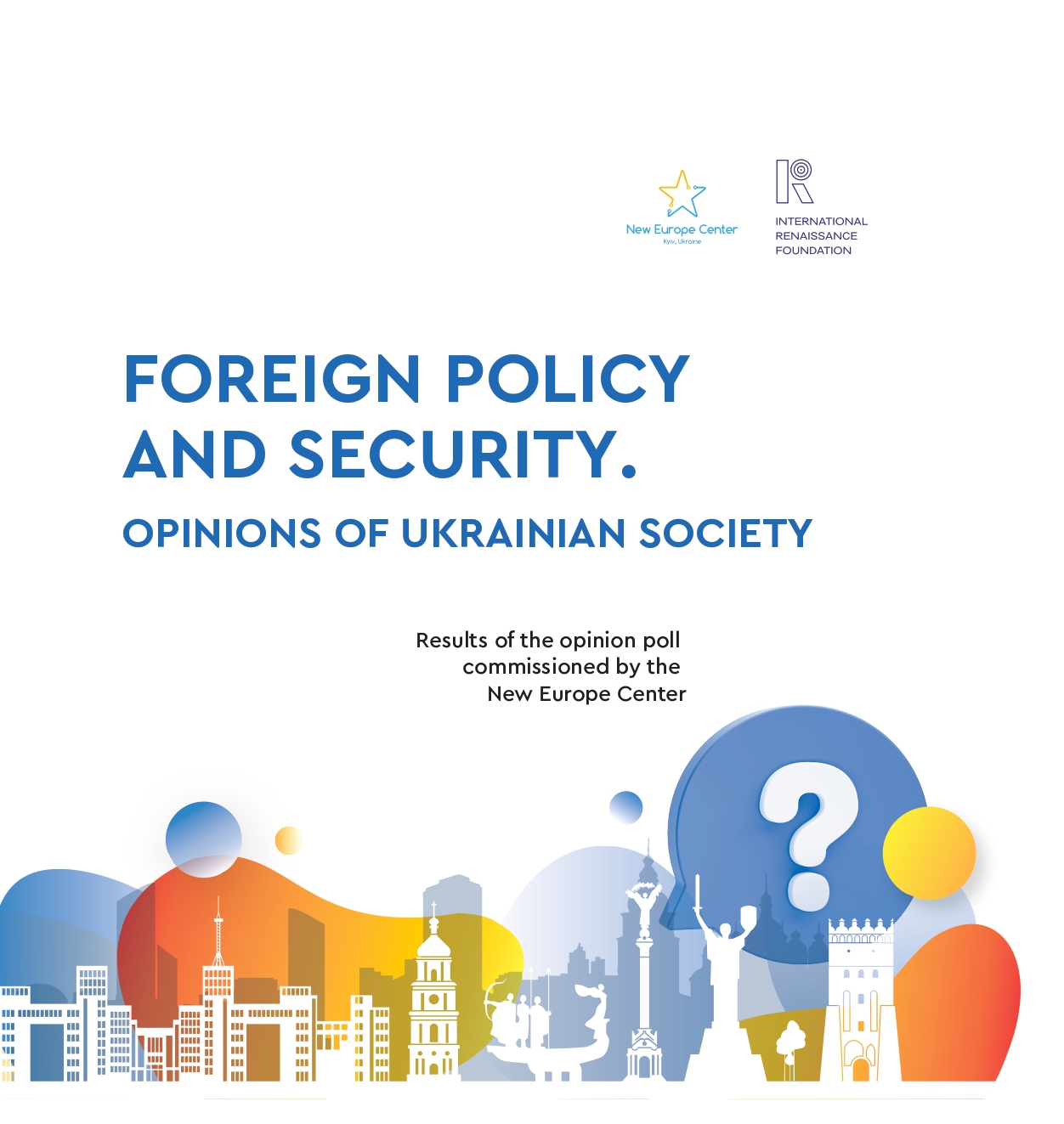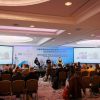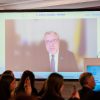
Сommissioned by the New Europe Center INFO SAPIENS conducted the study, in which the opinions of Ukrainians regarding security issues, in particular:
- What do you consider the best “security guarantee” for Ukraine?
- Should Ukraine start negotiations with Russia, in case Ukraine will not receive security guarantees from the West?
- Under what circumstances should Ukraine engage in negotiations with Russia?
- In peaceful negotiations with Russia, what concessions do you consider acceptable?
- Do you support gradual accession of Ukraine to NATO, where Ukraine will be invited in its internationally recognized borders, but Article 5 will be applied to all territories of Ukraine that are not temporarily occupied?
- Could Ukraine become a member of the EU without NATO membership?
- When will Ukraine become a member of the EU?
- What are your thoughts when you hear representatives of the EU and the USA addressing corruption in Ukraine?
- In your opinion, are the partners doing everything possible for Ukraine’s victory?
- Could the Victory Plan declared by President Zelenskyy lead to fair peace?
- Among foreign leaders, who inspires the greatest trust in you?
Read the results of the survey via the following link.
More about presentation of oponion poll via the link.
SUMMARY
A mixture of disappointment and optimism. More faith in ourselves than in our partners. These are probably the two key impressions from the results of a new survey commissioned by the New Europe Center and conducted by our long-time partner INFO Sapiens. We have been conducting this kind of final annual survey since the end of 2021. If we compare the latest and last year’s surveys, we can see quite significant changes in attitudes.
Overall, trust in Western leaders has fallen. The majority of Ukrainians believe that their partners are not doing enough to ensure Ukraine’s victory. The number of people who believed in the effectiveness of Western pressure to fight corruption has slightly decreased. All these are rather worrying signals against the backdrop of constant talks about the possible withdrawal of support for Ukraine and the coercion of Ukrainians to make concessions to Russia.
The majority of Ukrainians see no point in negotiations with Moscow, as they believe that it will still engage in new aggression after a short pause. The respondents support negotiations only if Russia proves its commitment to peace (withdraws its troops) or if Western partners provide Ukraine with reliable security guarantees. We can see that Ukrainians have become somewhat more open to some compromises in possible negotiations with the aggressor country, but this does not apply, for example, to issues such as granting Russian the status of an official language or reducing the size of the Armed Forces.
However, in general, Ukrainians remain optimistic about the vector to the West. Ukrainians support the country’s accession to NATO – in particular, for the first time, there is high support for gradual accession to the Alliance, where Ukraine will be invited within its internationally recognised borders, but Article 5 of Washington Treaty will be applied to all territories of Ukraine that are not temporarily occupied.
Many respondents believe that Ukraine will join the EU as soon as possible (within five years). The champions of public trust among foreign leaders are European Commission President Ursula von der Leyen and Polish President Andrzej Duda. However, the only Western leader whose trust has increased over the past year is French President Emmanuel Macron. US President Joseph Biden and German Chancellor Olaf Scholz, meanwhile, have seen the sharpest drops in their ratings over the past year. Paradoxically, the leaders of the countries that have helped Ukraine the most seem to have become the biggest disappointment for Ukrainians, perhaps because they thought to have the most responsibility. On the positive side: The EU, NATO, and the G7 enjoy a high level of trust among Ukrainians. On the negative side, but expected: The UN and the OSCE are completely discredited in the eyes of the organisation’s respondents.
KEY FINDINGS
Best security guarantees – nuclear weapons and NATO
Ukrainians surveyed are almost equally likely to consider the development of nuclear weapons by the state (31.3%) and gradual accession to NATO (29.3%) to be the best guarantees of Ukraine’s security. Other security options are less popular. For example, 11.2% believe in the effectiveness of a defence alliance with the United States, while 8.9% of Ukrainians are ready to rely on UN peacekeepers. Even fewer respondents believe in the effectiveness of European troops on the territory of Ukraine – only 6.4%. It cannot be ruled out that the answers were also influenced by the opinion of how realistic this or that option is. In any case, the trend towards self-sufficiency is evident: in recent years, Ukrainians have associated their main security expectations primarily with the Armed Forces of Ukraine, and then with foreign partnership opportunities. The almost identical levels of support for the development of Ukrainian nuclear weapons and NATO membership may demonstrate the struggle between two main approaches – between a sovereign approach to strengthening own security and a belief in collective defence.
Scepticism about negotiations with Russia
64.1% of Ukrainians believe that negotiations with Russia are not worthwhile unless Ukraine receives real security guarantees from the West. The argument is that Russia will start the war again after a short pause. About 30% of respondents are in favour of negotiations in any case, as they believe Ukraine does not have the resources for a war of attrition. In general, Ukrainians are mostly sceptical about ‘negotiations for the sake of negotiations.’ The age group of 30–39 years old is most in favour of negotiations (almost 40%). The regional dimension of supporters of negotiations is as follows: Kyiv is the most distrustful (only 18%), almost the same number in the West (20%), and the majority of supporters in the South and East – 34.5% and 43.7% respectively.
First, withdrawal and security guarantees, then negotiations
Almost 40% of respondents believe that Ukraine should negotiate only when Russia withdraws its troops (at least to the positions before 24 February 2022). Another 26.2% of Ukrainians believe that a precondition for negotiations should be security guarantees from Western countries, which would make it impossible to repeat aggression. Under no circumstances should we negotiate with Russia – this option was chosen by 12.1% of respondents. It is noteworthy that last year’s opinion poll[1] recorded more than twice as many people who chose the same hardline position – 33.4%. Thus, we are witnessing an increase in supporters of the negotiation process, but only if the right preconditions and circumstances are in place. Negotiations without any preconditions are supported by only 16% of respondents.
No concessions, but…
New Europe also asked respondents to assess the possibility of certain concessions in peace talks with Russia. The main conclusion is that most Ukrainians do not accept concessions to the Russians. However, compared to last year, we see a certain softening of the respondents’ position. Thus, this year, 53.2% believe that it is unacceptable to refrain from the reclaiming of the occupied territories. A year ago, this figure was 76.2%, a decrease of more than 20%. Last year, 56.9% of Ukrainians did not accept the refusal to join NATO, this year – 48.7%. Last year, 61% of respondents ruled out joining the EU altogether, while this year the figure is 50.7%. The number of those who strongly opposed the waiver of criminal prosecution of Russian leaders and war criminals decreased by 10% (from 77% to 68.4%). The impossibility of reducing the amount of reparations by Russia has changed slightly. The high level of unacceptability of concessions remains with regard to granting the Russian language state status (70.9%) and reducing the Ukrainian army (74.5%). The language and the army are apparently perceived as the existential foundations of the state, which cannot be the subject of any discussions with other states.
An overwhelming majority supports gradual accession to NATO
70.3% of Ukrainians support the idea of Ukraine’s gradual accession to the Alliance, meaning when NATO invites Ukraine within its internationally recognised borders (with Article 5 of the Washington Treaty applying to the entire state, except for the temporarily occupied territories). The starting point of this model is the West German model of accession: Germany became a member of NATO in 1955, but the country’s eastern states were able to join the Alliance only after German reunification in 1990. However, a significant difference between gradual and partial accession is that the invitation to join NATO will apply not only to Ukraine without the temporarily occupied territories, as was the case with West Germany, but to the whole of Ukraine, including the occupied territories.
In the Ukrainian discourse over the past two years, the discussion has focused mainly on Ukraine’s partial accession to NATO, when the occupied territories are allegedly ‘given’ to Russia in exchange for NATO membership for the unoccupied territories. Of course, this option does not find support from Ukrainians in polls either. In fact, the point is that these territories are also invited to join the Alliance, but will only be able to come under the Alliance’s security umbrella after their de-occupation in the future. Over the past year, in our publications and comments, we have drawn attention to the difference between partial accession and gradual accession. As we can see, gradual accession found support by the majority of Ukrainians.
With the EU but without NATO?
Most Ukrainians do not see any interdependence between joining NATO and the EU. 53.9% of respondents believe that Ukraine can become a member of the EU without joining NATO, as these are not directly linked processes. However, more than a third of respondents (34.4%) believe that Ukraine must first guarantee its security, which is possible only through NATO membership. EU representatives often admit that the European Union is not able to guarantee security to the extent that NATO can, despite the existence of its own analogue of Article 5, Article 42.7, which is still actively invoked in those EU capitals that do not support or consider unrealistic Ukraine’s invitation to join NATO. However, perhaps the best proof that Article 42.7 cannot guarantee the same security as Article 5 of the Washington Treaty is the decision of the formerly traditionally neutral EU members Sweden and Finland to become part of the North Atlantic Treaty Organisation. The high support for Ukraine’s EU membership without joining NATO may indicate a lack of public debate on the security preconditions for Ukraine’s movement and membership in the European Union. In fact, Kyiv also needs security guarantees to protect its accession to the EU.
34% of super-Euro-optimists
More than a third of Ukrainians (34%) believe that Ukraine will become a member of the EU within the next 5 years. The same optimistic timeline can be heard from representatives of the Ukrainian authorities. 17.2% of respondents chose a longer period – within the next 10 years. ‘As soon as the war is over’ – 16.8% of respondents consider this scenario likely. More than a decade is expected to be spent on the path to membership for 11% of Ukrainians. There are not many outright sceptics among Ukrainians: only 13% of respondents believe that Ukraine will never become a member of the EU. The relative dispersion of opinions about the timeframe of our European course may indicate a certain ‘maturity’ of Ukrainians who understand the complexities associated with joining the EU. On the one hand, we are talking about a lot of domestic reforms that Ukraine will have to implement in a timely manner. There is also a growing consensus that the emphasis in joining the EU should be on defending Ukraine’s interests, not on speed[2]. On the other hand, Ukrainians also see rather restrained reactions to the EU’s own timetable for candidate countries’ accession, and attempts to make future enlargement dependent on internal reforms in the Union.
Self-criticism on the way to the EU
63% of Ukrainians believe that we need pressure from the EU and the US to overcome corruption. Ukrainian politicians have often resorted to a standard practice at different times: as soon as foreign observers draw attention to corruption challenges, talk of interference in internal affairs immediately begins in Ukraine. ‘Isn’t there corruption in the EU?’ – double standards are another favourite trick of defenders of the “sovereignty of corruption”. At the same time, Ukrainian citizens were mostly sceptical about such arguments, seeing the EU and the US as reliable like-minded partners who would contribute to positive changes in Ukraine. As we can see, the high level of support for Western pressure on Ukrainian corrupt officials continues to be maintained, but we still observe a certain decline (last year the figure was 7% higher). Votes in favour of Western pressure have shifted to other options. For example, support for the thesis ‘The EU and the US are looking for excuses to deny Ukraine more support’ has increased by almost 4%. It seems that the slow and not always decisive assistance to Ukraine in the fight against Russian aggression may have influenced the assessment of Western partners’ actions in other areas, including the fight against corruption.
Disappointment with Western partners
The majority of Ukrainians (57.2%) believe that our partners are not doing enough to ensure Ukraine’s victory. Almost 40% are convinced that our partners are doing everything possible for our victory. In many of the responses to this survey, we can see exhaustion and frustration among Ukrainians. The West’s approach of supporting Ukraine for as long as it takes seems to be failing not only among experts, but also among society at large. It is unclear how long and to what extent the West will be able to continue supporting Ukraine. Attempts by some Western politicians to reach an agreement with Putin (possibly at the cost of unacceptable concessions for Kyiv) are becoming more and more obvious. Foreboding of the worst is also affecting the assessments and attitudes of Ukrainians. This is especially evident in the results of the next question about trust in foreign leaders.
Top 5 foreign leaders in terms of Ukrainians’ trust: Ursula von der Leyen, Andrzej Duda, Justin Trudeau, Emmanuel Macron and Maia Sandu
The leaders of public trust among Ukrainians are European Commission President Ursula von der Leyen and Polish President Andrzej Duda, who have virtually the same score (65%). Canadian Prime Minister Justin Trudeau is in third place (almost 60%). French President Emmanuel Macron is not far behind (58.4%). Fifth position belongs to President of Moldova Maia Sandu (57.3%). Ursula von der Leyen’s championship is most likely a reflection of Ukrainians’ gratitude for the European Commission President’s efforts to promote Ukraine’s path to EU membership. Her undisputed leadership in securing key decisions for Ukraine at the EU level, combined with her deep understanding of the unprecedented security environment in which Ukraine is forced to start accession negotiations with the EU, is visible to ordinary Ukrainians.
Trust in the leadership of the Polish president is a kind of tribute to tradition, as Polish leaders and Poland in general are perceived in a positive light by Ukrainian society (more so than by Ukrainian political elites) by inertia. However, it is also worth noting the fact that compared to the previous year, the decline in trust in the Polish president is more than obvious – by 13.1%. And if we compare it with the figure for 2022 (86.8%), when Andrzej Duda was the undisputed leader of Ukrainians’ trust, we can talk about a catastrophic drop of public sympathy (one in five Ukrainians has been disappointed in the Polish leader over the past three years). We would hazard a guess that the main explanations for the loss of trust in the Polish president are the unprecedented actions of blocking the state border, as well as statements by Polish politicians (not necessarily President Duda) on the topic of search and exhumation work in Ukraine and in the context of Poland’s continued support for Ukraine in issues that are critically important to it, including progress in accession negotiations with the EU.
At the same time, it is not entirely clear why Canadian Prime Minister Justin Trudeau is among the top three trust leaders. This assessment of Ukrainian society is at odds with the opinion of the New Europe Center’s experts, who believe that the country’s potential does not match the level of assistance it provided to Ukraine during the full-scale war. For example, Canada placed 14th in terms of the share of assistance provided to Ukraine as a percentage of its GDP among other states that help our country (0.421%)[3]. In terms of military aid as a share of GDP, Canada ranks 21st overall (0.134%). Also, Justin Trudeau was perhaps the only Western leader to support German Chancellor Scholz’s phone call to Vladimir Putin.
Biden and Scholz are losing trust. There has been a noticeable drop in the level of public trust in foreign leaders in general. While last year the record holder in terms of trust was US President Joseph Biden with a score of almost 82%, now the leaders are ‘competing’ for a level of 65%. This reflects the general scepticism of Ukrainians in assessing the efforts of the international community (and the United States in particular) to support Ukraine. Most leaders saw a drop in their level of trust – while, for example, Biden had a score of almost 82% last year, this year it is 55.2% (a drop of 27%). Scholz had 61.4% of trust, and now it is 24.5% less. One in four Ukrainians is disappointed in the leaders of the countries that provide the most assistance to Ukraine in absolute terms, but that are still noticeably paralysed in their decisions by the fear of Putin’s Russia, which undoubtedly affects the dosed amounts, slow pace and types of assistance provided. This has a direct impact on Ukraine’s ability not only to liberate the occupied territories, but also to properly defend itself.
Positive dynamics – Macron and two ‘misunderstandings’. French President Emmanuel Macron was the only Western leader with a positive trend, i.e. an increase in trust rather than a decline: last year, 54.5% of people trusted him, and this year – 58.4%. Although the increase was only 4%, it is not so bad compared to other leaders. It seems that Ukrainians have not overlooked Macron’s efforts to change the Western strategy to support Ukraine, such as his clear position on inviting Ukraine to join NATO, the French leader’s initiative to send military components to Ukraine, etc.
If we analyse the growth of support for all foreign leaders in general, we can also see a slight increase in support for representatives of some hostile states. While in the case of Putin, it is more of a change within the margin of error, as the level of trust in him is still close to zero, the situation with Alexander Lukashenko is a little different: about 3% of Ukrainians (the increase in trust) may have forgotten from whose territory Putin invaded in 2022. Perhaps the factor of gratitude that a ground invasion from Belarus and with the participation of Belarusian soldiers, the risks of which have been repeatedly reported in media publications over the past two years, never happened, also worked. On the contrary, Lukashenko slightly changed his rhetoric to less hostile.
Trump is ‘growing’. The rather high level of trust among Ukrainians in the new US President Donald Trump is noteworthy, especially against the backdrop of the corresponding indicator for Joseph Biden and given similar trust ratings in European countries. For example, in France, Trump was trusted by 16%, in the UK by 30%, and only Hungary is the most favourable, with 37%[4], which is still less than the level of trust among Ukrainians – 44.6%. This high level of support is likely due to the expectation of a clearer and more decisive policy towards Ukraine from the new US administration. It cannot be ruled out that some respondents have certain hopes for the restoration of peace in Ukraine, which Trump emphasised during his election campaign. Apparently, Trump’s high level of trust could also be due to disappointment in the current US president, who recorded a significant drop in the indicator. Last year, we asked Ukrainians: ‘Who do you sympathise with more – Donald Trump or Joseph Biden?’. The current president was the undisputed leader of sympathy with 78.1%. Only 10.1% of respondents preferred the leader of the Republican Party.
Western organisations are in favour. Especially the EU
Although some of the answers in this survey show some disappointment with the actions of the West, we also see a high level of trust in Western institutions. Thus, Ukrainians trust the following international organisations, groups or associations the most: the EU (69.2%), NATO (64.4%), and G7 (62.4%). At the same time, organisations whose direct responsibility is to protect Ukraine enjoy low public trust. Trust in the UN stands at 37.9%, and in the OSCE at 34.6%.
Victory Plan: everything depends on the West
A relative majority of Ukrainians (35.2%) do not know about the Victory Plan or do not understand the essence of the document. However, one in three respondents (30.9%) is aware that the Plan was created primarily for the West, which should support Ukraine more, so everything depends on our partners. The Plan is considered unrealistic by 18.6% of respondents. Only 12.3% of Ukrainians believe that it will really lead to victory and peace.
The opinion poll was prepared with the support of the International Renaissance Foundation. The conclusions from the document reflect the position of the authors and do not necessarily coincide with the position of the International Renaissance Foundation.
[1] Preconditions for Negotiations, “Security Guarantees,” and Trust in Foreign Leaders – opinion poll. New Europe Center, 5 December 2023: https://neweurope.org.ua/analytics/pro-peredumovy-dlya-peregovoriv-bezpekovi-garantiyi-i-doviru-do-zakordonnyh-lideriv-opytuvannya/
[2] A survey poll for EUAM Ukraine. Rating sociological group. 28 October 2024: https://ratinggroup.ua/research/ukraine/uspih-chi-ni-yak-ukrayinci-ocinyuyut-reformuvannya-organiv-pravoporyadku-ta-pidtrimku-yes.html
[3] Ukraine Support Tracker. Kiel Institute, 2024: https://www.ifw-kiel.de/topics/war-against-ukraine/ukraine-support-tracker/
[4] Pew Research Center, Confidence in Donald Trump, 2024: https://www.pewresearch.org/global/2024/06/11/confidence-in-donald-trump/







